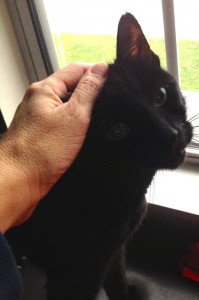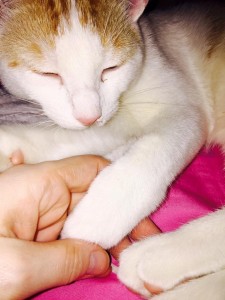By Lisa Provost
Being a caregiver is one of the hardest jobs in the world. It’s stressful, exhausting, frustrating, depressing and rewarding. But being a caregiver to a sick animal is hands down all of those things and more times three. The advantage of caring for a human is of course communication. A cat can’t tell you where it hurts, how much it’s hurting, what they need or when it started. It’s extremely tough to read the signs of illness since they’re notoriously good at hiding them. And even if you can tell certain behaviors, it’s not a guarantee it’ll make things any easier. Cats have a naturally finicky nature which precludes anything else and makes it extra tough to figure out what’s going on.
 Because a cat’s body is built differently than ours, there is an enormous amount of information to research and take in. I had never even heard of IBD in humans, never mind in cats. So in order for me to understand what I was up against, I started studying the cat’s anatomy and the possible treatments for this ailment. To try and figure out what’s going on in your cat’s body, you’ve got to have a handle on the disease. And unfortunately with IBD and the co-existing conditions, there is no such handle. This disease changes symptoms and severity constantly, gives you false hopes and makes you painfully aware that you’re not the one in control.
Because a cat’s body is built differently than ours, there is an enormous amount of information to research and take in. I had never even heard of IBD in humans, never mind in cats. So in order for me to understand what I was up against, I started studying the cat’s anatomy and the possible treatments for this ailment. To try and figure out what’s going on in your cat’s body, you’ve got to have a handle on the disease. And unfortunately with IBD and the co-existing conditions, there is no such handle. This disease changes symptoms and severity constantly, gives you false hopes and makes you painfully aware that you’re not the one in control.
One day you feel as if you’ve got it even a little bit figured out and maybe, just maybe you can start your kitty on the road to recovery. Then out of nowhere, things change and you’re back to square one. Feeling lost and confused, angry and mystified. Why is this happening? What did I do wrong? What am I going to do now? What else can we try? How will I pay for these treatments, tests and checkups? These questions are on every parent’s mind as they struggle to help their kitty get well.
There are no easy answers to these questions, I wish I had some. I continue to struggle with these questions even years after I lost Alex to these awful conditions. I’ve since lost two more; my sister’s cats, Midnight and Moufasa, who I was caring for full time for years. It’s also difficult for me to see people in my support group every day going through what I did. And some cases are extremely difficult and much more complex than what I dealt with. Some are making headway though and that’s the reason for the Living With IBD section of this website.
Take some of these simple guidelines and try and use them the best you can. It’s not going to be easy but at least it’s a beginning.
 Try and accept the situation for what it is. This is a long-term, power struggle between you and a condition that has no known cause or cure. Accept that this is going to be a lot of work and you’ll need to make a commitment to your cat’s road to recovery. There will be a daily regime of medications, changes in feeding times, vet visits, holistic treatments, researching and patience on your part. This is especially true in the first couple of months but when you find what works well for your cat, you’ll be able to spot the day-to-day improvements. To make that easier on yourself, keep a daily journal of your cat’s medications, improvements, what causes setbacks, etc. Charts also help a lot with remembering if they’ve gotten all their supplements, medications and treatments that day.
Try and accept the situation for what it is. This is a long-term, power struggle between you and a condition that has no known cause or cure. Accept that this is going to be a lot of work and you’ll need to make a commitment to your cat’s road to recovery. There will be a daily regime of medications, changes in feeding times, vet visits, holistic treatments, researching and patience on your part. This is especially true in the first couple of months but when you find what works well for your cat, you’ll be able to spot the day-to-day improvements. To make that easier on yourself, keep a daily journal of your cat’s medications, improvements, what causes setbacks, etc. Charts also help a lot with remembering if they’ve gotten all their supplements, medications and treatments that day.
Your cat will probably not be as happy as it used to be, they won’t be playing too much for awhile, and they’ll be more tired and irritable. This is completely normal as this is an autoimmune disorder that can wreck havoc on your cat’s body. It’s depressing and hard for you as their parent to watch them like this. Accept that it may take awhile until your kitty feels better, depending on the severity of your cat’s condition. But also understand that they are resilient and I’ve seen kitties literally on death’s door bounce back to the point that even the vets are astounded. They are amazing creatures.
Ask your family members for help if they can. If you have kids, teach them the importance of what you’re doing and that they can and should be as much help as they can be, especially if you work. Your spouse, if you have one, also needs to step up to the plate. Let them know that this is their little baby also and that you can’t do it alone. Otherwise it may become too much for you to handle. There are unfortunately some people that don’t have anyone to help them and must go through this alone. If you are alone, reach out to someone else you know who is an animal lover. A neighbor, a friend, a pet sitter! Just having someone there to talk to once in awhile who understands the pain and worry you’re going through can alleviate a lot of the stress you’re feeling. It’s extremely hard for us as parents to watch our kitties be so sick. It’s a helpless feeling and most often, you end up taking on a lot of that pain yourself.
Acknowledge your own needs. Remember that you absolutely need to take care of yourself. That’s the tricky part because as any parent will tell you, it’s just not always possible, but it’s a must. Don’t let the stress run you right into the ground. You will most likely be in crisis mode at some point during this ordeal and a crisis always robs you of a little bit of yourself, if not a lot! Try hard to leave a little time for yourself now and then. Don’t let this disease rob you of everything, live your life, even a little bit at a time. You’ll be better prepared to go through this rough patch, no matter how long or short it is. Try to get a petsitter on occasion so you can take a day off here or there. Treat yourself to some alone time or out with friends. You will have a hard time, we all do. We hate leaving them for even a minute knowing how sick they are. But if you’re burnt out, you’re no good to yourself or anyone else, especially your kitty. Try to get a petsitter who’s a vet tech and does petsitting on the side. You’ll feel better about leaving them alone with a sick pet as they’ll know what to do in an emergency.
Adapt to the ever-changing symptoms. The ups and downs, highs and lows of this disease can be brutal on you. There isn’t one parent I’ve met yet that isn’t pulling their hair out at some point because of the emotional roller coaster they’ve found themselves on. It’s the unfortunate truth that this disease will dumbfound you on many occasions and it will test your care taking stamina to the fullest.
 Shower them with love and affection. They need it so much right now. After giving them their medication, give them a kiss and tell them you love them. Talk to them and tell them several times a day what a good baby they are and that they’re brave and strong. Tell them you’re doing everything you know how to do to help them and ask them to be patient with you. I used to lie down next to Alex and rub her shoulders and look into her eyes and say, “Please tell me what to do for you sweetheart. Please tell mommy how to help you.” She knew what I was saying and she would purr and just let me love her. That’s all they need to know, is that amidst all of the hardship they’re going through, that it’s out of love for them.
Shower them with love and affection. They need it so much right now. After giving them their medication, give them a kiss and tell them you love them. Talk to them and tell them several times a day what a good baby they are and that they’re brave and strong. Tell them you’re doing everything you know how to do to help them and ask them to be patient with you. I used to lie down next to Alex and rub her shoulders and look into her eyes and say, “Please tell me what to do for you sweetheart. Please tell mommy how to help you.” She knew what I was saying and she would purr and just let me love her. That’s all they need to know, is that amidst all of the hardship they’re going through, that it’s out of love for them.
Respect that cats are very dignified animals that would go off in the wild somewhere and die alone if they could, that’s their nature. So when your kitty has severe diarrhea and you need to do some clean up, understand that they will be NOT be happy about it. They won’t be happy about being stuck with needles, taking pills or being force-fed. They hate being handled in this way and will most likely let you know it. But they have a way of also letting you know that they understand that you’re trying to help them. And they will ultimately be the ones making the decision as to whether to stay and fight or to give up. And you have to respect that decision when it comes.
And most importantly don’t be so hard on yourself, you’re human. Getting tired and needing help is normal, make sure to get some rest whenever you can, try hard to eat well and communicate your feelings. Don’t give up on them as long as they’re still fighting to stay alive. Let them take the lead and tell you if things are just too bad to keep going. Otherwise, the days of automatically putting your cat to sleep are over. There have been a lot of advancements in the last fifteen years in veterinary medicine, and there needs to be a lot more. But understand that there are many different treatment choices available now and more being implemented every year. They can still live many more years with a good quality of life! That’s always the important thing, quality of life, not quantity. At home hospice, and pallative care is available for pets now, just like with people. It’s a wonderful thing and vets are now being taught how important that is in vet school. You may also get to a point where you may not want to pursue some treatments, for your kitty’s sake. No one can tell you where that line is for you and your pet. If you’re not sure, then ask yourself this question, “What would I want done for myself”? That will hopefully allow you to make the right choices either way. Remember that whatever the decision, it’s not what’s best for you but what’s best for them that matters
